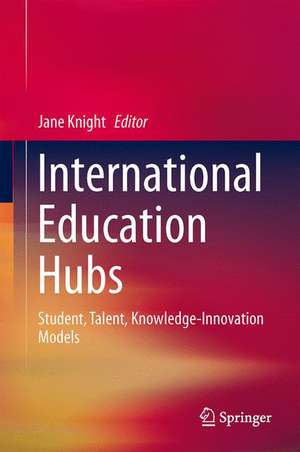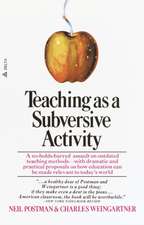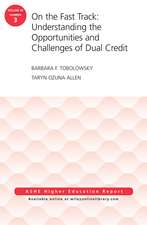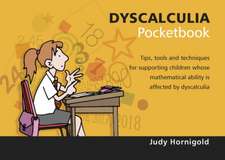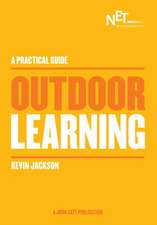International Education Hubs: Student, Talent, Knowledge-Innovation Models
Editat de Jane Knighten Limba Engleză Hardback – 20 sep 2013
But given higher education’s current preoccupation with competitiveness, branding, and economic benefits are education hubs merely a fad, a branding exercise, or are they an important innovation worthy of serious investment and attention? This book tries to answer the question through a systematic and comparative analysis of the rationales, actors, policies, plans and accomplishments for six serious country level education hubs - United Arab Emirates, Qatar, Malaysia, Hong Kong, Singapore and Botswana .
The in-depth case studies shows that "one size does not fit all". A variety of factors drive countries to prepare and position themselves as an education hub. They include income generation, soft power, modernization of domestic tertiary education sector, economic competitiveness, need for trained work force, and most importantly a desire to move towards a knowledge or service based economy. In response to these different motivations, three different types of education hubs are being developed: the student hub, talent hub, and knowledge/innovation hub.
Scholars, policy makers, professionals, students and senior decision makers from education, economics, geography, public policy, trade, migration will find that this book challenges some assumptions about crossborder education and provides new insights and information.
| Toate formatele și edițiile | Preț | Express |
|---|---|---|
| Paperback (1) | 638.57 lei 6-8 săpt. | |
| SPRINGER NETHERLANDS – 27 aug 2016 | 638.57 lei 6-8 săpt. | |
| Hardback (1) | 644.82 lei 6-8 săpt. | |
| SPRINGER NETHERLANDS – 20 sep 2013 | 644.82 lei 6-8 săpt. |
Preț: 644.82 lei
Preț vechi: 758.60 lei
-15% Nou
Puncte Express: 967
Preț estimativ în valută:
123.40€ • 128.10$ • 102.90£
123.40€ • 128.10$ • 102.90£
Carte tipărită la comandă
Livrare economică 25 martie-08 aprilie
Preluare comenzi: 021 569.72.76
Specificații
ISBN-13: 9789400770249
ISBN-10: 9400770243
Pagini: 200
Ilustrații: VIII, 251 p. 4 illus.
Dimensiuni: 155 x 235 x 20 mm
Greutate: 0.54 kg
Ediția:2014
Editura: SPRINGER NETHERLANDS
Colecția Springer
Locul publicării:Dordrecht, Netherlands
ISBN-10: 9400770243
Pagini: 200
Ilustrații: VIII, 251 p. 4 illus.
Dimensiuni: 155 x 235 x 20 mm
Greutate: 0.54 kg
Ediția:2014
Editura: SPRINGER NETHERLANDS
Colecția Springer
Locul publicării:Dordrecht, Netherlands
Public țintă
ResearchCuprins
Dedication.- 1. Introduction; Jane Knight.- 2. Understanding Education Hubs within the Context of Crossborder Education; Jane Knight.- 3. An Analytical Framework for Education Hubs: Student, Talent, Knowledge-Innovation; Jane Knight and Jack Lee.- 4. The Evolution of Qatar as an Education Hub: Moving to a Knowledge Economy; Arwa Ibnouf, Lois Dou and Jane Knight.- 5. United Arab Emirates Education Hub: A Decade of Development; Warren Halsey Fox and Sabha Al Shamisi.- 6. Hong Kong: The Quest for Regional Education Hub Status; Ka Ho Mok and Peter Bodycott.- 7. Malaysia: Becoming an Education Hub to Serve National Development; Mohd Ismail Abd Aziz and Doria Abdullah.- 8. Singapore: Building a Knowledge and Education Hub; Ravinder Sidhu, Ho Kong-Chong and Brenda Yeoh.- 9. Botswana: Africa’s First Education Hub; Bridget Poppy John, David Wilmoth and Brian Mokopakgosi.- 10. Emerging Education Hubs: Korea, Sri Lanka, Mauritius, Bahrain; Lois Dou and Jane Knight.- 11. Comparative Analysis of Education Hubs; Jane Knight.- 12. Issues, Indicators, and Reflections; Jane Knight.- Bibliography.- Index.
Recenzii
“Withher book Jane Knight provides another interesting example of how differentglobal phenomena manifest themselves in regional or local contexts in the fieldof higher education. … The intended audience seem to be primarily policy makersin the field of higher education and innovation/knowledge creation, but alsoother readers interested in the ongoing developments in International EducationHubs in the (mainly) Eastern Hemisphere.” (Laura Sturzeis, Higher Education,Vol. 70, 2015)
“This volume is the first book to examine a broad range of topics related to international education hubs. For all those who have an interest in education hubs and cross-border education, whether they be a policy-maker, institution manager, scholar or student, there should be much of interest and value in thisbook. … For anyone who wants to learn more about international education hubs, this volume provides a wealth of information and ideas … .” (Stephen Wilkins, Journal of Higher Education Policy and Management, Vol. 36 (3), June, 2014)
“This volume is the first book to examine a broad range of topics related to international education hubs. For all those who have an interest in education hubs and cross-border education, whether they be a policy-maker, institution manager, scholar or student, there should be much of interest and value in thisbook. … For anyone who wants to learn more about international education hubs, this volume provides a wealth of information and ideas … .” (Stephen Wilkins, Journal of Higher Education Policy and Management, Vol. 36 (3), June, 2014)
Textul de pe ultima copertă
Education hubs are the newest development in the international higher education landscape. Countries, zones and cities are trying to position themselves as reputed centres for higher education and research.
But given higher education’s current preoccupation with competitiveness, branding, and economic benefits are education hubs merely a fad, a branding exercise, or are they an important innovation worthy of serious investment and attention? This book tries to answer the question through a systematic and comparative analysis of the rationales, actors, policies, plans and accomplishments for six serious country level education hubs - United Arab Emirates, Qatar, Malaysia, Hong Kong, Singapore and Botswana .
The in-depth case studies shows that "one size does not fit all". A variety of factors drive countries to prepare and position themselves as an education hub. They include income generation, soft power, modernization of domestic tertiary education sector, economic competitiveness, need for trained work force, and most importantly a desire to move towards a knowledge or service based economy. In response to these different motivations, three different types of education hubs are being developed: the student hub, talent hub, and knowledge/innovation hub.
Scholars, policy makers, professionals, students and senior decision makers from education, economics, geography, public policy, trade, migration will find that this book challenges some assumptions about crossborder education and provides new insights and information.
But given higher education’s current preoccupation with competitiveness, branding, and economic benefits are education hubs merely a fad, a branding exercise, or are they an important innovation worthy of serious investment and attention? This book tries to answer the question through a systematic and comparative analysis of the rationales, actors, policies, plans and accomplishments for six serious country level education hubs - United Arab Emirates, Qatar, Malaysia, Hong Kong, Singapore and Botswana .
The in-depth case studies shows that "one size does not fit all". A variety of factors drive countries to prepare and position themselves as an education hub. They include income generation, soft power, modernization of domestic tertiary education sector, economic competitiveness, need for trained work force, and most importantly a desire to move towards a knowledge or service based economy. In response to these different motivations, three different types of education hubs are being developed: the student hub, talent hub, and knowledge/innovation hub.
Scholars, policy makers, professionals, students and senior decision makers from education, economics, geography, public policy, trade, migration will find that this book challenges some assumptions about crossborder education and provides new insights and information.
Caracteristici
The first systematic study completed on the new development of International Education Hubs Presents evidence and analysis supporting the finding that there are three types of International Education Hubs emerging: Student, Talent and Knowledge-Innovation Wide geographic coverage - includes analysis of 10 education hubs in Asia, Africa and the Gulf region Places the development of education hubs within the broader frameworks of crossborder education and internationalization Includes supplementary material: sn.pub/extras
